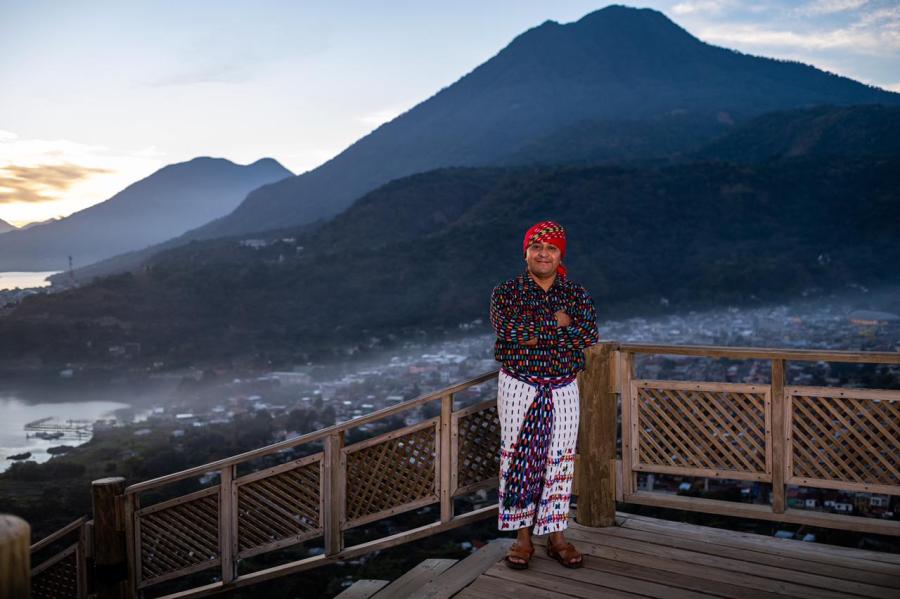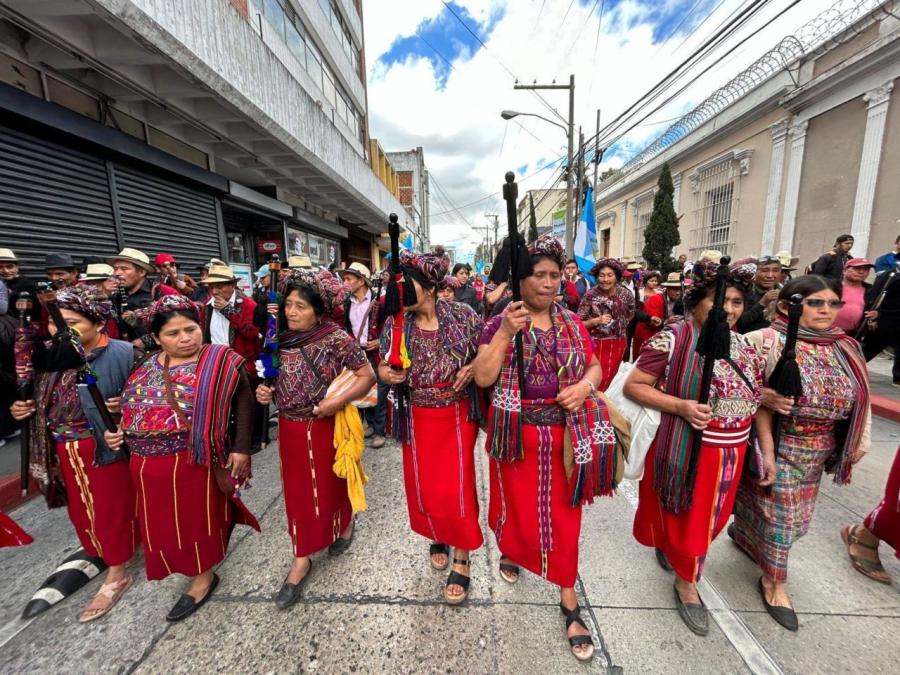
By César Gómez (Maya Poqomam, CS Staff)
As time goes by, communications evolve. Facebook, Instagram, X, WhatsApp, are some of the platforms that, second by second, minute by minute, interconnect millions of people around the world, bringing the borders of countries closer. However, these new technologies require the purchase of data, making their use dependent on the market and excluding the vast majority of the population who cannot afford them.
“This is where community radio in times of the internet continues to play a fundamental role in the communication of the peoples of Latin America,” says Gustavo Gómez of the Latin American Observatory of Media Regulation and Convergence (OBSERVACOM). In addition, Gómez believes that "radio continues to be an instrument of proximity, an instrument that can allow us to talk about other issues, and that allows other protagonists to make their own communication an exercise of their sovereign rights to freedom of expression," and we add, to the right to the environment, to the right to nature, to the right to health, and to the right to education. The expert concludes that radio will continue to be a fundamental tool, and its communicators will continue to be essential.
Oscar Perez of the World Association of Community Radio Broadcasters, Latin America Region (AMARC-ALC) reaffirms, "Many have been killing radio for a long time when television arrived, followed by the Internet. However, I believe in complementarity, and radio, for me, has existence and continues to influence the life of the communities."
Indeed, Indigenous community radio in Guatemala plays a very important role in informing and educating the audience in their own languages, giving a voice to communities that have never had the opportunity to express themselves through media. "Since 1996, Guatemala's indigenous communities have demanded legal recognition from the State through regulations based on the commitments made during the signing of the Peace Accords," says Anselmo Xunic (Maya Kaqchikel) of the Guatemalan Community Radio Movement.
In 2012, in view of the non-compliance with the Peace Accords, the communities denounced the State before the Inter-American Commission on Human Rights for violating the freedom of expression of Indigenous Peoples, a complaint that was admitted and transferred to the Inter-American Court of Human Rights. The Court took up the case and summoned representatives of the State and the Indigenous community radio stations to a hearing in June 2021. During the arguments of the parties, the Inter-American Commission on Human Rights argued that Article 13 of the American Convention on Human Rights protects the right to establish community broadcasting media, as well as the enjoyment and exercise of the right to freedom of expression (paragraph 64 of the Court's judgment).
"In the hearing, the victims affirmed that the State of Guatemala, through the Public Ministry, has persecuted and imprisoned community communicators without a legal basis, silencing the voice of Indigenous Peoples," said Xunic. The State, for its part, defended that they were acting on the basis of the laws of the country and that at no time was access to the frequencies being limited, describing that the General Telecommunications Law allows everyone to participate in the auctions. After the hearing, the international high court issued a sentence in the case Maya Kaqchikel Indigenous Peoples of Sumpango and others, vs. Guatemala, finding the State of Guatemala guilty of violating freedom of thought and expression, as well as the right to participate in cultural life and the right to equality before the law.
Gustavo Gómez points out that the judgment of the Inter-American Court is historic, just, and in accordance with the American Convention on Human Rights, and adds: "We have not seen in all of Latin America a judgment of the depth and forcefulness that this case has had in protecting the rights to freedom of expression of the Mayan radio stations. Although it is a sentence on a specific case, in a specific country, its content, its foundations, and its scope are part of a jurisprudence that can be extended to other countries," he concludes.
This ruling is key to continuing the struggle for the democratization of communications in Latin America. The ruling lists the reparations that the State must make in favor of the Indigenous communities, which are: first, to regulate the radioelectric spectrum, that is, it must pass a law that legally recognizes Indigenous community radio stations. Second, it should refrain from raids and prosecutions of community communicators. Third, it must eliminate all criminal convictions. Fourth, it must publish the summary of the sentence in the official newspaper and in one of the most widely circulated newspapers in the country. Fifth, it must consider specific reparations for the four communities identified in the case as victims.
The State of Guatemala has taken very slow steps. It has partially complied with 75 percent of the two points, the publication of the sentence, and specific reparations to the four victims. However, it has not advanced in the approval of a law for Indigenous community radio stations, it has not eliminated the criminal convictions against Indigenous communicators who have open proceedings in the courts, nor has it granted the four victim radio stations the concession of frequencies so that they can work freely without fear of being raided by the Public Prosecutor's Office.
Although there were deadlines, these have not been met, denoting a lack of commitment to comply with the ruling. Gómez affirms: "The State has the obligation to comply with the judgment because it accepted the competencies of the International Court; this is not an imposition of an external body. Therefore, it is accepted that when a person, a people, or a community understands that the judicial system or the state of their country violates their rights, when they have tried to legally resolve it within their country, but do not succeed, and the violation of fundamental rights, in this case freedom of expression, persists; the State of Guatemala freely and sovereignly accepted that this case could reach the Inter-American Court, and therefore accepted that the decisions it makes must be complied with."
In recent meetings held at the Presidential Commission for Peace and Human Rights (COPADEH), officials of the Superintendence of Telecommunications have stated that the sentence cannot be complied with because there are no more frequencies available in the radio-electric spectrum. Oscar Pérez, from AMARC, believes that the regulator has always responded to the political and, above all, economic interests of the Chamber of Broadcasting of Guatemala. "I'm not saying anything new; everyone is saying it," he explains. They are the ones who put pressure on public officials to maintain the privileges of the commercial media and, Pérez adds, "this then translates at the political level into advertising, into campaigns to favor the government of the day."
"It has always been said that the problem is not technical but political," says Xunic. For his part, Gómez states, "The spectrum is very limited. However, if the Superintendency had the will, it could review the technical regulations, modify them, and allow for the creation of more radios than those that exist today." Perez adds: "The spectrum is an asset of all Guatemalans. Therefore, the State is called upon to make its administration efficient and democratic." In AMARC's view, the State must reorder the spectrum and ensure that 33 percent of it is used for the benefit of community radio broadcasting. Since meeting with heads of legislative blocks years ago, it was demonstrated, with technical data, that there are many frequencies available in the departments. In some of them, there are spaces for 50 stations to be installed, and only 18 licenses have been granted, which means that there is enough space on the dial.
OBSERVACOM indicates that if the refusal to comply continues, a letter can be sent to the Court explaining what has happened so that it can take the appropriate measures. The community radio stations hope that the new government will commit itself to compliance. "We hope that this new government will bring a new spring; that it will give us legislation that can guarantee a diverse and pluralistic media system where all the radio stations that make Guatemala a great country can fit," says Pérez. Gómez concludes: "On World Radio Day, let's call for much more radio. Without community and Indigenous radio, there is neither democracy nor freedom of expression."


